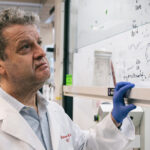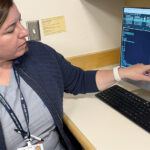Ryker’s comeback from osteochondritis dissecans
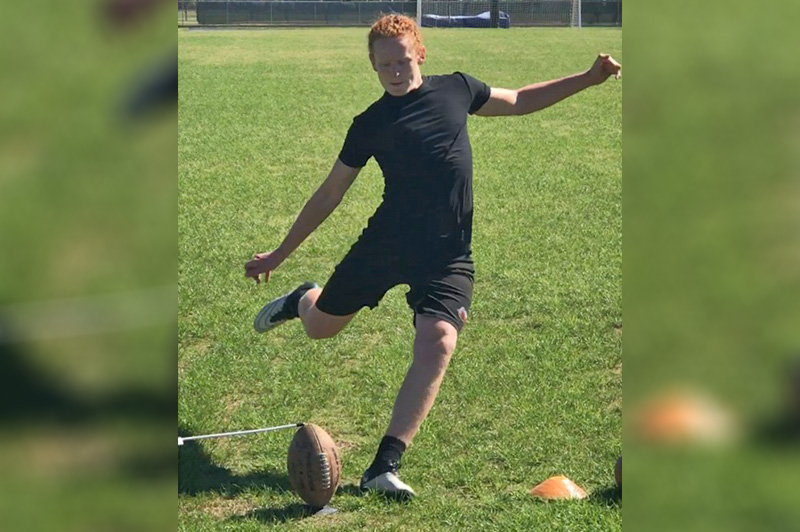
When Ryker Casey takes the field, everything comes down to the strength of his legs and precision of his kick. As a football kicker, he sends the ball deep into the opponent’s end zone at kickoff and earns extra points for his team by sending the ball through the field goal, sometimes from 50 yards away or farther.
Ryker was a high school junior in October 2017 when he and his team took to the field to warm up for one of the season’s final games. From the stands, his parents, Lori and Patrick, watched as he practiced his kickoffs. They had seen their son kick thousands of footballs, but his next move surprised them. “Ryker walked over to the bench and started taking his gear off,” remembers Lori.
When his parents rushed down to him, Ryker told them he’d felt a sharp, sudden pain in his right knee, his kicking leg, when he landed on it. Lori contacted a sports medicine specialist the following Monday. By Friday, they had a diagnosis: Ryker had a joint disorder called knee osteochondritis dissecans, frequently referred to as knee OCD, and needed surgery.
Growing up with sports
Ryker’s childhood in New Smyrna Beach, Florida revolved around sports. He started playing soccer when he was 3 and started competing at the age of 4. “He was just one of those kids,” says Pat. “From an early age, he strove to be the best player he could possibly be. If another kid did a move on him, he would go home and practice that move over and over until he could do it too.”
Ryker started kicking in eighth grade and soon, football pushed other activities, like parties and hanging out with friends, to the sidelines. “He gave up his childhood so he could go to practice and tournaments,” says his mother. Such tradeoffs were necessary if Ryker wanted to achieve his goal of kicking for a Division 1 college team. By tenth grade he was so good, college recruiters had started showing up at his games.
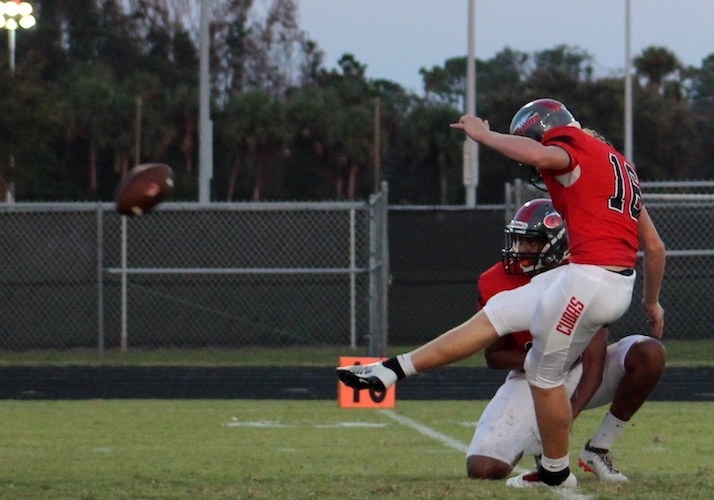
At a time when everything seemed to be lining up for Ryker, osteochondritis dissecans inserted a big question mark into his future. The Caseys learned that the blood supply to a small area in the bone of his knee, just next to the joint surface, had been disrupted. Over time, a fragment of bone and cartilage had broken loose from the joint. “When the doctor in Florida gave us the diagnosis, he told us this was one of the larger OCD lesions he’d seen,” recalls Lori.
Welcome to the world of orthopedic surgeons
Pat and Lori quickly went into overdrive, looking for a doctor to repair Ryker’s knee. A surgeon in Texas recommended an open surgery to reattach the loose bone with a metal screw. “He told us he would need to do a second surgery a few months later to remove the screw,” says Lori. The family held out hope Ryker would still have a chance to play Division 1 football. But he would have to be playing again by the start of the 2018 season. A second surgery would delay his recovery. The family kept looking.
Dr. Benton Heyworth at Boston Children’s Hospital recommended arthroscopic surgery. He told the Caseys he would use specialized biodegradable pins to reattach the bone and then drill holes in the healthy bone around the knee to restore the blood supply. “When we asked him why he wanted to do it that way, he told us, ‘I want to give Ryker’s knee the best possible chance to heal, and I want to do it the least invasive way I can,’” says Lori.
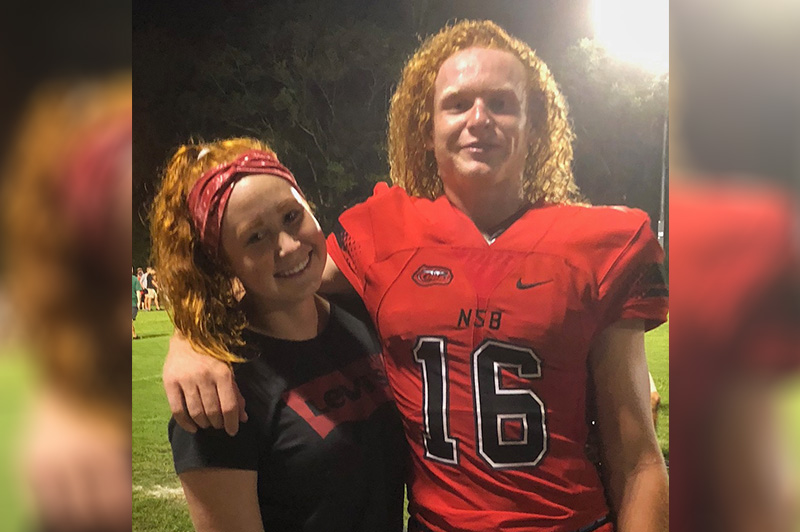
Ryker had surgery in Boston in late November 2017. The procedure required several small arthroscopy portal incisions in the tissues around Ryker’s damaged knee. The family spent four days in Boston and returned to Florida to wait out the recovery.
Most likely to become a professional heckler
How does an ultra-athletic teenager entertain himself when he can’t put any weight on his leg for eight weeks?
Football season had ended but basketball season was in full swing by the time Ryker returned home with strict orders from Dr. Heyworth to stay off his leg. For eight weeks, he followed these orders and went to school in a wheelchair. After school, he went to his team’s practice. “He went to every basketball practice and every game that season,” says Lori. The referees got to know him as the kid in the wheelchair who questioned their calls — loudly. His head coach voted him “Most likely to become a professional heckler.” It wasn’t as good as playing but it got him through the season.
Strong comeback
After months of recovery, physical therapy, and hours in the gym, Ryker was on the field for the start of his senior 2018 football season. “After the surgery, I got real big into weightlifting,” he says. “I came back better and stronger than I was before.” In his senior year, Ryker was awarded Player of the Game three times and averaged 38.2 yards per punt. His longest punt traveled 51 yards.
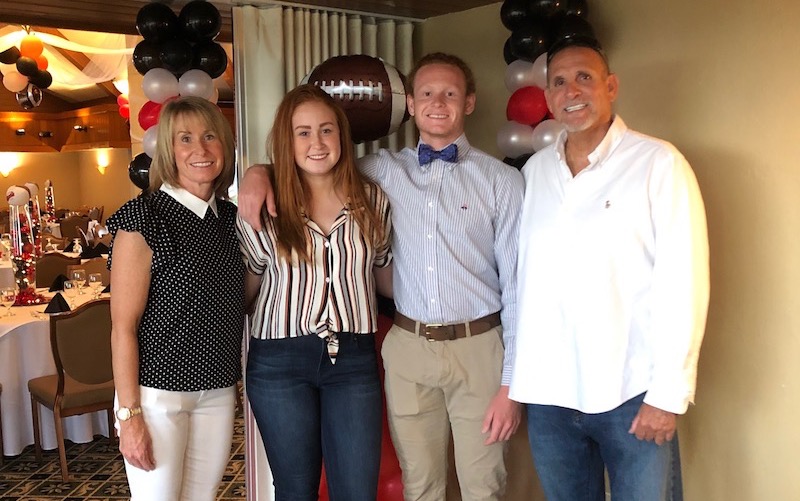
In January 2019, he participated in the Kohl’s National Senior Challenge. Kohl’s is an organization that ranks high school kickers, punters, and snappers for college football coaches. Ryker made his mark with an 88-yard kickoff with a 4.0 second hang time and a 65-yard field goal. He was seated in first place for the second day of competition and ultimately placed first in the kickoffs.
Colleges come knocking
“Right after the challenge, the University of Florida coach contacted us,” says Pat. “He said, ‘We have a place for you if you want it.’” Ryker was also contacted by Indianna University, Naval Academy, Texas State, and University of Buffalo. In the end, he chose Appalachian State University and started working out with its Division 1 team in early July.
Looking back on how uncertain they all felt after her son’s injury, Lori says, “Dr. Heyworth was willing to work with us and try anything. His attitude was, ‘how are we going to get Ryker back to kicking?’” With a mixture of pride and relief, Pat adds, “Ryker probably wouldn’t be doing what he’s doing right now if it weren’t for Dr. Heyworth.”
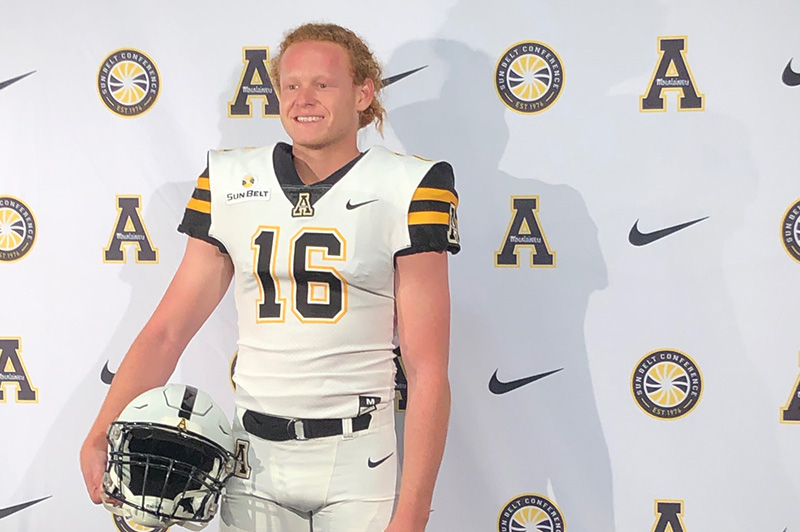
Learn more about the Sports Medicine Division at Boston Children’s.
Related Posts :
-

A safe, pain-specific anesthetic shows preclinical promise
All current local anesthetics block sensory signals — pain — but they also interrupt motor signals, which can be problematic. For example, ...
-

Adam takes a pause from his active life for non-ossifying fibroma
Adam was 11 in early 2024 when he and his bike slid under a downed tree. Such events aren’t unusual for ...
-

Ask a sports medicine specialist: Why are ACL tears so common among female athletes?
When an athlete is sprinting after an opponent who suddenly stops or changes direction, their anterior cruciate ligaments (ACLs) make ...
-

Forging a path back to school after orthopedic trauma
Orthopedic trauma can force children to miss school, sometimes for an extended period. But even when patients have regained enough ...


